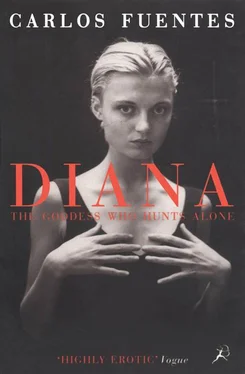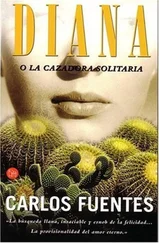Carlos Fuentes - Diana the Goddess Who Hunts Alone
Здесь есть возможность читать онлайн «Carlos Fuentes - Diana the Goddess Who Hunts Alone» весь текст электронной книги совершенно бесплатно (целиком полную версию без сокращений). В некоторых случаях можно слушать аудио, скачать через торрент в формате fb2 и присутствует краткое содержание. Год выпуска: 2012, Издательство: Bloomsbury UK, Жанр: Современная проза, на английском языке. Описание произведения, (предисловие) а так же отзывы посетителей доступны на портале библиотеки ЛибКат.
- Название:Diana the Goddess Who Hunts Alone
- Автор:
- Издательство:Bloomsbury UK
- Жанр:
- Год:2012
- ISBN:нет данных
- Рейтинг книги:3 / 5. Голосов: 1
-
Избранное:Добавить в избранное
- Отзывы:
-
Ваша оценка:
- 60
- 1
- 2
- 3
- 4
- 5
Diana the Goddess Who Hunts Alone: краткое содержание, описание и аннотация
Предлагаем к чтению аннотацию, описание, краткое содержание или предисловие (зависит от того, что написал сам автор книги «Diana the Goddess Who Hunts Alone»). Если вы не нашли необходимую информацию о книге — напишите в комментариях, мы постараемся отыскать её.
Diana the Goddess Who Hunts Alone — читать онлайн бесплатно полную книгу (весь текст) целиком
Ниже представлен текст книги, разбитый по страницам. Система сохранения места последней прочитанной страницы, позволяет с удобством читать онлайн бесплатно книгу «Diana the Goddess Who Hunts Alone», без необходимости каждый раз заново искать на чём Вы остановились. Поставьте закладку, и сможете в любой момент перейти на страницу, на которой закончили чтение.
Интервал:
Закладка:
Azucena sighed. “A beautiful woman doesn’t look for beauty in her partner.”
It seemed a cruel remark coming from her. I imagined the roles reversed. Azucena and a handsome man. The equation was unfair. Once again, the man was the winner. Never the woman.
In the hall, I ran into Lew Cooper. He didn’t say anything to me. He just grunted.
Azucena ran out into the street after me and handed me something.
“You forgot this.”
It was a marmalade jar full of hairs.
XXX
Jealousy kills love, but it leaves desire intact. That’s the real punishment for betrayed passion. You hate the woman who broke the love pact, but you still desire her because her betrayal was the proof of her passion. That was the case with Diana. We didn’t end in indifference. She had the intelligence to insult me, to humiliate me, to attack me savagely so I wouldn’t resign myself to forgetting her, so I would go on desiring her with what we call jealousy, that perverse term for erotic will.
I saw the Santiago house for the last time in the growing darkness of a February afternoon. Now it was an impregnable fortress. That house I walked in and out of as if I owned it, where I wrote every day, was now alien and repugnant to me. I wanted to besiege it the way the Romans besieged Numantia in Spain, to burn it and destroy it the way the legions burned and destroyed the Jews’ Masada. It was with that desire that I gave it a farewell glance, that I circled it one last time, as if instead of penetrating Diana I could penetrate the house we shared.
Fate had given me that woman. No man could take her away from me. Least of all someone I considered a coreligionist, a left-wing student, a traitor … The fetid smell of tear gas drifted in from the center of town, and at that moment I wished that the army had captured my rival, that General Cedillo personally had cut off his balls, and that if he escaped I might one day find him and have the courage to kill him myself. As I thought about it, though, I was gripped by an amusing irony: “Don’t deprive the government of that pleasure.”
Norman Mailer says jealousy is a portrait gallery of which the jealous man is the curator. I summoned up the images of each and every one of my moments with Diana, but now with the young student in my place, in my positions, enjoying what had been mine, filling his mouth with the taste of peaches, enjoying the limitless wisdom of Diana’s caresses, transformed into the sole spectator of the lake in which the Huntress is reflected …
Jealousy is like a life within our lives. We can catch a plane, go back to the capital, call up friends, begin writing again, but all the time we’re living another life, apart although within ourselves, with its own laws. That life inside our lives manifests itself physically. There’s a battle in our guts. We wake up, and it’s Omaha Beach at Normandy in our stomachs. True. A savage, bitter, bilious tide swirls, rises, and falls from our heart to our guts and from our guts to our worn-out, useless sex, a war casualty. It makes you feel like pinning a Purple Heart on your dick. And then a funeral wreath. But the tide doesn’t celebrate anything and doesn’t stay in one part of the body for very long. It runs through it like a poisonous liquid, and its objective is not to destroy your body but to besiege it and squeeze it so its worst juices rise to your head, stick like hard green serpent scales on your tongue, on your breath, in your eyes …
For a moment, the break made me feel expelled from life. The way you feel when someone you love dies. But we can show that pain. The dark, poisoned pain of jealousy must be hidden, to avoid both compassion and ridicule. Exposed jealousy exposes us to the laughter of others. It’s like returning to adolescence, that unfortunate age in which everything we do in public — walk, talk, look — may be the object of someone else’s laughter. Adolescence and jealousy separate us from life, keep us from living it.
The curious thing about this experience of mine was that I felt separated from life, not out of adolescent fear of the ridiculous but because of the fatal sadness of age. Diana made me feel old for the first time. I was forty-one. My rival couldn’t be more than twenty-four. Diana was thirty-two. I laughed. Once in Italy I tried to get into a discotheque with an eighteen-year-old American girl. The man at the door stopped me, saying, “It’s only for young people.” To which I replied, with a straight face, “I’m her daddy.”
I was thirty-five then. How many doors would be closing on me now, one after another? She said that she was doing it for my own good. In ten years, she’d be barrel-assed and flabby. I was sorry I hadn’t said no, that she could be someone else — she wanted that anyway — if she gave herself over to her profession, if she stopped looking for roles that would give meaning to her life outside the movies … Thinking that over, I tried to convince myself of my superiority. All I had to do was to work seriously on my own stuff: I wouldn’t get old in ten or even a hundred years. That was the power of literature. But on the condition that we share that power with others. And I, as I said, felt I’d fallen from my initial power, and in that I was like Diana. My literary anointment, like her Saint Joan, was long past. The aura of the beginning was fading, dying. How do you rekindle the flame?
I returned from Santiago with a handful of useless pages. All I had to do was read them coldly, as a counterpoint to my burning internal convulsion, to realize they were no good. I would publish them anyway. They had a political purpose. But if no one read them, what political purpose would they serve? I was willfully fooling myself. I needed to lie to myself as a creator in order to survive as a man. But at the center of my unquiet desire, one conviction shone with a brilliance that grew day by day. The writer’s other is not there, big as life, waiting for what he hopes he’ll be given. The reader must be invented by the author, imagined, so that he reads what the author must write, not what it is expected he will write. Where is that reader? Hidden? Let’s find him. Unborn? We must wait patiently for him to be born. Writer, toss your bottle into the sea, be confident, don’t break your word — your words — of honor even if today no one reads them. Wait, desire, desire, even if no one loves you …
I could never have said this to Diana Soren. Something melodramatic and pointless would have come out, like “There are great roles for mature actresses.” It would have been pointless because at that moment in her life Diana Soren wouldn’t have known what to do with her own success.
I realized that and loved her more than ever. I loved her all over again. Thinking that saved me from my ardor, from my interrupted way of living, from my break and expulsion from life, from my life within my life but separated from my life. That is, it saved me from my jealousy. I saw her, with the little distance I’d managed to win, as a woman who really did know who she was. A foreigner wherever she was, condemned to solitude and exile. A political activist, condemned this time to despair, irrelevance, and finally, again, solitude. A mature actress condemned to decadence, oblivion, and forever, again, solitude. The story of Diana Soren is the story of her solitudes. Diana was the goddess who hunts alone.
Did she and I share that? I could formulate only one answer. I would have given everything for her, only because she wouldn’t have given anything for me.
Accepting that truth was how I distanced myself once and for all from Diana, renouncing all my romantic illusions of getting back together with her or spending time together … Perhaps only one link remained between us. We could tell a story to all those who’ve wanted to free themselves from a love relationship without hurting anybody. It’s impossible.
Читать дальшеИнтервал:
Закладка:
Похожие книги на «Diana the Goddess Who Hunts Alone»
Представляем Вашему вниманию похожие книги на «Diana the Goddess Who Hunts Alone» списком для выбора. Мы отобрали схожую по названию и смыслу литературу в надежде предоставить читателям больше вариантов отыскать новые, интересные, ещё непрочитанные произведения.
Обсуждение, отзывы о книге «Diana the Goddess Who Hunts Alone» и просто собственные мнения читателей. Оставьте ваши комментарии, напишите, что Вы думаете о произведении, его смысле или главных героях. Укажите что конкретно понравилось, а что нет, и почему Вы так считаете.












